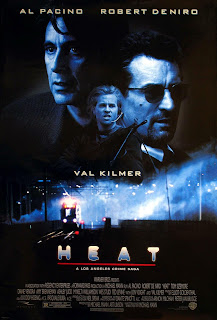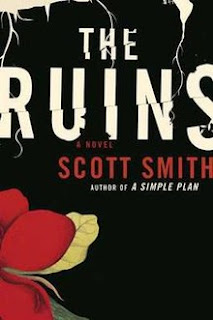I've mentioned this film on more than one occasion, and although I'll always be grateful to Michael Mann for the incredibly fun and period setting series, Miami Vice, I will arguably always look back on this film as his magnum opus. That's saying something too, as I praised Collateral extensively in my review of that film. I'm hoping to slowly, but surely make it through his entire filmography, as there are actually more than a few of his big ones that I still haven't seen. I want to stress that despite my nostalgia for this one, I approached with a critical mind, and yet it still manages to take my breath away every single time I see the credits roll.
 1
1Where You Can Find It: I checked this out on Amazon Video where it is available for rent/purchase.
General Information
Heat is a crime thriller film that was released on 15 December 1995. It was written, directed, and co-produced by Michael Mann with Art Linson also co-producing. Regency Enterprises and Forward Pass produced the film while Warner Bros. distributed. Dante Spinotti provided the cinematography for the film, while Elliot Goldenthal scored. Surprisingly, this is a remake of the made-for-television film, L.A. Takedown, which was also directed by Michael Mann; however, it seemingly suffered from artistic differences between Mann and its parent distributor: NBC. Financially, Heat was a success at the box office as it essentially broke even at the domestic box office with approximately $67 million and an additional $120 million at the international box office. Critically, the film holds a 76 Metascore on Metacritic, while it has an 87% Tomatometer rating on Rotten Tomatoes.
On 9 August 2022, a sequel will be released, called Heat 2, but only in novel form. According to Deadline, the book was co-written by Michael Mann and Meg Gardiner. It will serve as both a prequel and sequel to the events of the first film, while also exploring the actions of some of the side characters featured in the original as well. I personally find the idea of a sequel (even in book form) to be a bit strange considering how this film ends. I'm sure it can be done, but one could apply that same rationalization for nearly any of Michael Mann's films.
 2
2
The Story
After an armored truck heist goes wrong, professional thief, Neil McCauley (played by Robert De Niro), and his crew of bank robbers find themselves locked in a game of cat-and-mouse with the Los Angeles Police Department. Lieutenant Vincent Hanna (Al Pacino) takes on the case of bringing McCauley to justice, but he quickly learns that investigating McCauley won't be easy. The two are equally cagey and resourceful in how they navigate the Los Angeles underworld, but only one can come out on top. By the end of the investigation, both men will have to reckon with what they are both willing and unwilling to leave behind in the pursuit of their own individual goals.
One of the elements I enjoy most about this film is how it introduces its characters. Everyone gets a chance to shine, and the initial scenes of each player establishes how their individual role features into the overall narrative. As viewers, we're able to physically see that McCauley is calculating and cautious while his crew respects and admires him when they rob an armored car. Immediately after the initial heist, we then see that Hanna is equally perceptive and competent by how he's able to analyze the robbery's aftermath. These establishing scenes provide excellent first impressions for the two main characters; however, many of the side characters also get similar treatment like McCauley's friend, Chris (Val Kilmer), and ex-con, Don (Dennis Haysbert).
 3
3Hanna and McCauley are equal, yet opposing forces, but only one can come out on top
An overarching theme this film explores quite a bit of is how each of its characters are motivated. Everyone has a driving force behind them that causes them to do the things that they do, and these motivators frequently lead to collateral damage as the plot progresses. Hanna saddles himself with all of the pain and anguish of the victims of the crimes he investigates, which drives him to chase criminals like McCauley regardless of the personal cost. The same applies for McCauley as his mantra of never getting attached to anything or anyone inevitably leaves him at a crossroads when he develops a fondness for Eady (Amy Brenneman). This same dynamic is presented with nearly every character and it's fascinating to observe as the plot develops.
A final note on the narrative worth mentioning is just how compelling the chemistry between Hanna and McCauley really is. Although both men function well within a team as leaders, it's equally clear that the duo are both outsiders that slowly discover that they are quite alike to one another. This mutual regard blossoms into respect, which culminates in arguably one of my favorite scenes of all time.
Special Effects/AtmosphereOne of the most recognizable facets of Mann's signature direction is his attention to special effects. Right from the start, Mann shows that when things go "bang" it's pretty darn loud and pretty darn harsh. Action scenes are tightly shot and well-choreographed, while gunfire is especially loud. Years after its release, the climactic shootout (around two thirds of the way through the film) continues to reverberate throughout cinema as one of the most realistic portrayals of tactical maneuvering in film history.
 4
4The bank heist shootout scene remains legendary in modern-day film making
Although I would say that Mann's cinematography differs from the methodology seen in other greats like Drive and Nightcrawler, there's something to be said about how Dante Spinotti conveys many of the scenes he shoots. Like in Collateral, Heat makes Los Angeles feel alive and beautiful. One specific tableau re-enacts the Canadian artist, Alex Colville's, painting: Pacific. Shootouts are equally impressive as the camera keeps pace with the action while keeping close enough to capture the humanity of the players involved.
 5
5Heat on the left and Colville's Pacific on the right
A final bit of impressive direction is Mann's final thirty minutes of the film. Without getting into spoilers, there's a couple of moments in that final segment where Mann makes use of the film's extensive runtime (2 hours and 50 minutes) to present how one of the key characters grapples with conflicting motivations. Lastly, I found the deliberate removal of background music for the final shootout to be really fascinating as it makes the experience feel more secluded and personal.
The Acting
A big selling point for this film's advertising was that it would be Al Pacino facing off against Robert De Niro and it certainly makes good on that promise. On paper, Pacino's and De Niro's characters work well together and this relationship is only further enhanced by their equally impressive performances. Pacino arguably stands out the most as the bombastic Vincent Hanna. It's fascinating seeing him go from verbally berating Hank Azaria about a woman's posterior to comforting a grieving mother at a crime scene. It's an intense kaleidoscope of wildly varying emotions and situations that potentially even overshadows his performance in more famous works like Scent of a Woman and Scarface.
 6
6Al Pacino has a lot to say in this one, and I'm so there for it
On the other end of the duo, I must say that this is my favorite De Niro film as he counters Pacino's dynamic energy with a reserved stoicism. To some extent, it reminds me of his role as Vito Corleone in The Godfather: Part II; however, this iteration has less whispering and more confidence. There's a quiet power that radiates from De Niro throughout much of the film, and when he goes wild it's often brutal.
There are some fantastic supporting actresses that frankly all deserve noteworthy mentions alongside the two leading men. She doesn't appear too often in this, but I really bought into Natalie Portman's portrayal of Hanna's troubled step-daughter, Lauren. It's impressive that this is her second credited role in a feature film. Despite being a guy-centric film, I was also impressed by Amy Brenneman and Diane Venora (plays Justine Hanna). Venora's speech to Hanna near the half-way point of the film was quite compelling and her morose delivery really hammers the message home.
The Best of the Best: When Hanna and McCauley get coffee.
The Worst of the Worst: Having an extramarital affair with Alan Marciano.
Calhooey Score: 10/10 - Outstanding
Would I Recommend?

7
It's worth the heat
Heat sets the bar for all crime thrillers and arguably remains Michael Mann's greatest work. I highly recommend this to anyone who enjoys movies and especially to those that like heist films. This is a long film that takes its time with its characters, but every second is important and worth taking in.
Spoiler Comments
- Yet another movie where Danny Trejo plays himself.
- Raul sounds like a pretty cool dude.
- I hope they fired that SWAT guy that accidentally tipped McCauley off that the cops were on to him at the precious metals depository.
- I get that Chris (Val Kilmer) wants to show off his gun's bipod at the drive-in, but there's no point in having a bipod if you're going to stand and shoot with it.
- I could listen to Al Pacino rant at Hank Azaria about Ashley Judd's figure all day.
- Of the people I feel worst about by the end of this movie, I think it was Don (Dennis Haysbert) and Lillian (Kim Staunton). Don really had a chance to go straight, but the system failed him.
- I couldn't really say it without spoilers, but I really appreciate how most of the characters in this film have stakes behind them. When Don died, we saw the look of disappointment and sadness on Lillian's face. We also saw Bosko's (Ted Levine) wife in a previous scene to show that he had a family to go home to.
- Yep, that's none other than Jeremy Piven who's patching up Chris after the bank heist!
- I've said it before, and I'll say it again: never trust Xander Berkeley!
- Nobody gets to watch Hanna's TV. Not even Hanna, apparently.
- I know he had a fake ID, but they should've caught Chris. You're telling me LAPD didn't have a photo of him on file? All the dude did was get a haircut!
- My counting may be off, but I'm fairly certain that it took McCauley almost exactly 30 seconds to reconsider killing Waingro.
- It also took almost exactly 30 seconds from when McCauley sees Hanna outside the hotel to his decision to leave Eady.
- The tragic thing is that the only person that probably honestly understood Hanna was McCauley.
- Someone pointed this out to me, but did anyone else notice the bit of foreshadowing with the beginning truck heist? All the robbers but Chris wore white hockey masks, and all but Chris die by the end of the film.
References
(1) Heat. (1995). Heat film image. IMDB. Retrieved from https://www.imdb.com/title/tt0113277/.
(2) Mann, M. & Gardiner, M. (2022, August 9). Heat 2 cover image. Amazon. Retrieved from: https://www.amazon.com/Unti-Heat-Prequel-Michael-Mann-ebook/dp/B075WQM6PR/?pf_rd_r=7V49SMB3H1PCYJ84RPDD&pf_rd_p=9fbd5550-ddf3-4c03-b2f9-2d729d3b5abc&pd_rd_r=8641b463-c943-4291-8501-3724125865e7&pd_rd_w=w9Jei&pd_rd_wg=c8c4b&ref_=pd_gw_ci_mcx_mr_hp_atf_m.
(3)Myers, S. (2009, October 23). Hanna and McCauley diner meeting image. Going into the Story. Retrieved from: https://gointothestory.blcklst.com/script-to-screen-heat-c5034fc7263e.
(4)James, N. (2019 July 12). Bank shootout image. BFI. Retrieved from: https://www2.bfi.org.uk/news-opinion/sight-sound-magazine/interviews/reheating-heat-blake-howard-his-marathon-movie-podcast.
(5) RipeSpacePotato. (2019). Heat and Pacific comparison image. Pholder. Retrieved from: https://pholder.com/alex-colville.
(6) npawlows. (2017, February 5). Al Pacino woman's ass gif. Tenor. Retrieved from: https://tenor.com/view/heat-pacino-ass-womans-ass-gif-7718548.
(7) Carroll, A. (2020, December 13). McCauley and Eady image. HeadStuff. Retrieved from: https://headstuff.org/entertainment/film/heat-25th-anniversary-de-niro-pacino-mann/.
 1
1 2
2 3
3 4
4 5
5 6
6


I will watch. lol I love your enthusiasm
ReplyDelete